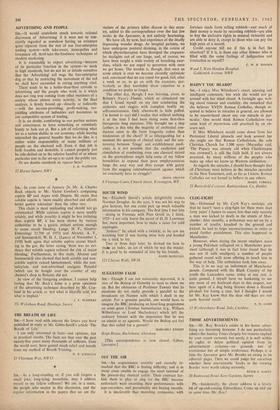ADVERTISING AND PEOPLE SIR,—It would contribute much towards rational discussion
of 'Advertising' if it were not so con- stantly regarded as somehow having an existence quite separate from the rest of our free-enterprise trading system—with take-overs, monopolies and fourpence off, devil-take-the-hindmost techniques of modern marketing.
It is reasonable to expect advertising—because of its particular function in the system—to work to high standards, but do not let us delude ourselves that the 'Advertising' tail wags the free-enterprise dog or that by restricting the movement of the tail we shall have succeeded in curing anything vital.
There' tends to be a holier-than-thou attitude to advertising and the people who work in it which does not ring true coming from other members of a society whose almost every activity, in the final analysis, is firmly bound up—directly or indirectly —with the income-providing, profit-making, tax- yielding attributes of industries and businesses in our competitive system of trading.
It is, no doubt, comforting to our puritan natures and consciences to have something or somebody handy to lash out at. But a job of reforming what we as a nation dislike in our economy, while leaving untouched the general benefits that we do like, is a rather wider responsibility of many millions of people on the electoral roll, Even if that job is both feasible and desirable, it cannot properly just be side-shifted on to the relative handful of us whose particular aim in the set-up is to catch the public eye.
Or are double standards de rigueur here?


































 Previous page
Previous page